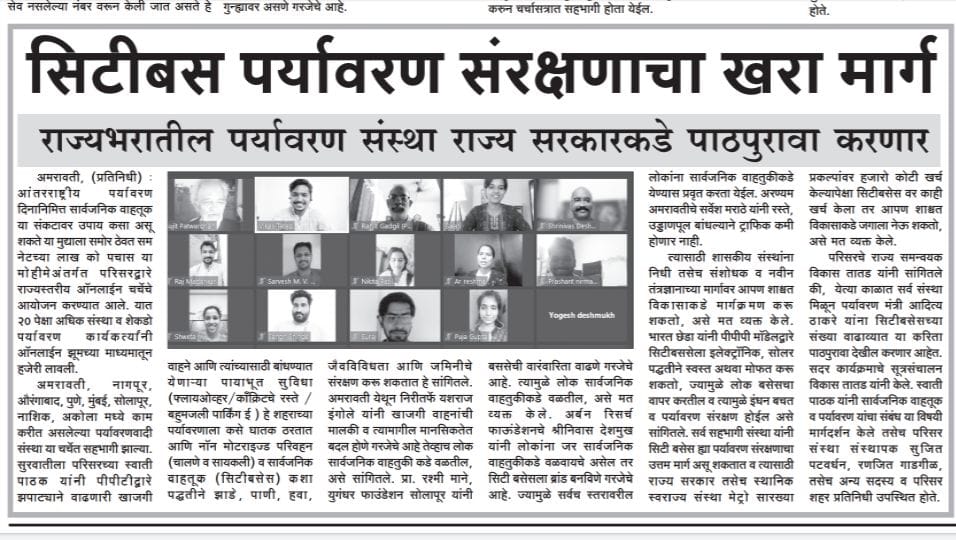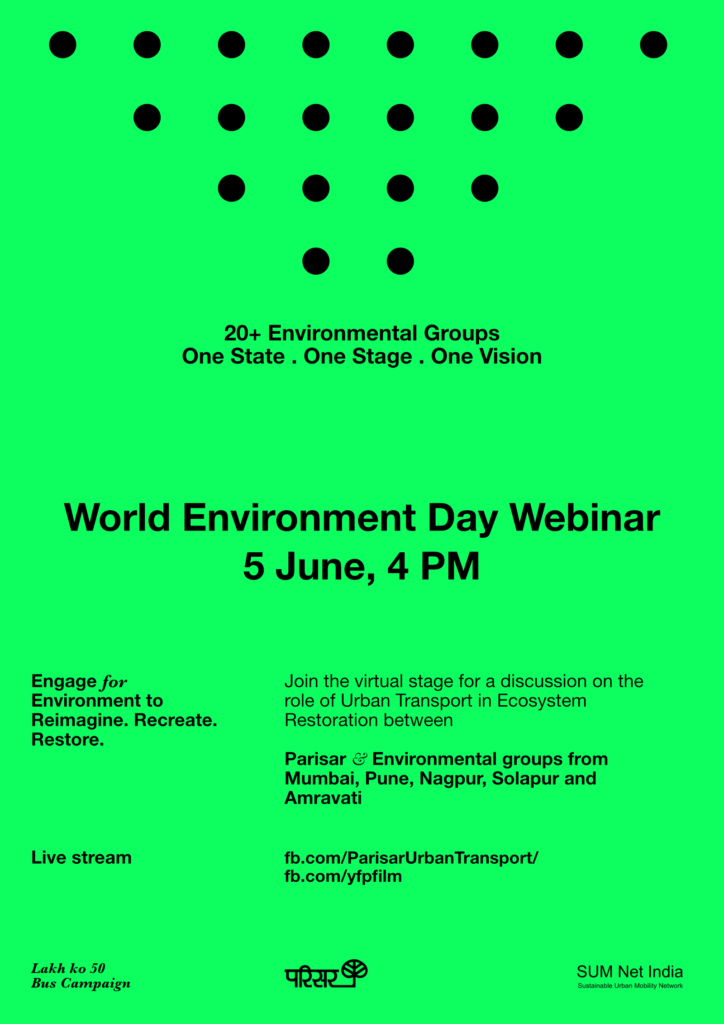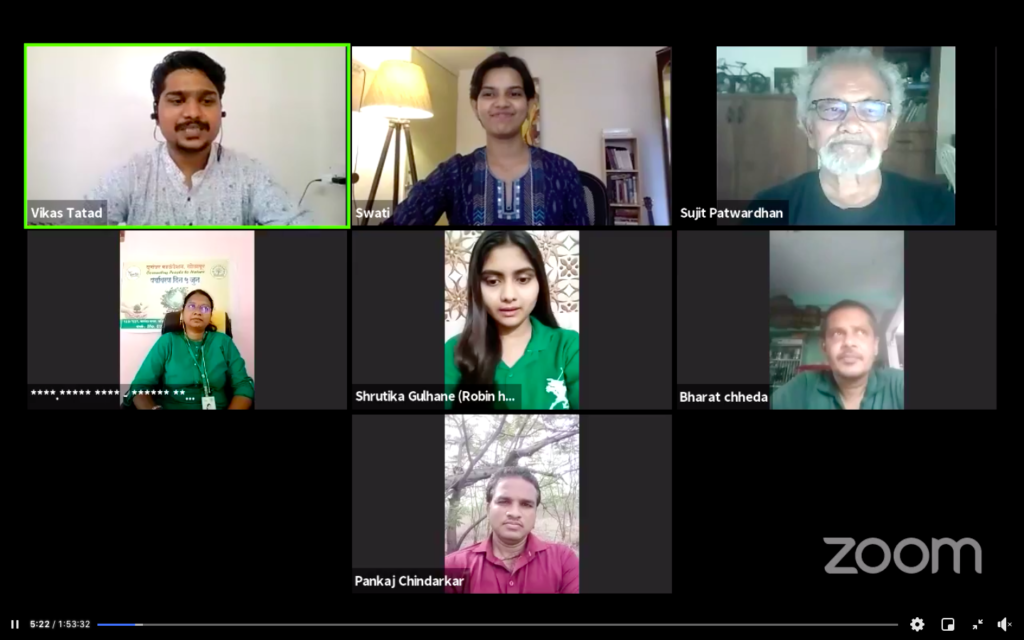World Environment Day is celebrated on 5th June every year with several activities, such as plantation and conservation of trees, plogging, waste collection, etc. highlighting the demand to protect the environment and save the planet. Urban public transport, which has a considerable impact on a city’s environmental crisis, hardly features in the activities that are organised to celebrate the Environment Day. ‘Lakh Ko 50’ bus campaign initiated by Parisar as part of SUM Net India’s efforts to improve bus services and increase bus fleet in the cities, is one such attempt, which celebrated the day with an online seminar on the topic of ‘connection between urban public transport and environment’. Over 20 like-minded organisations and several activists participated in this online event.

The webinar was organised by Parisar as part of its ‘Engage for Environment’ multi-city webinar series which received active participation from the organisations working in various cities in Maharashtra, viz. Amravati, Nagpur, Aurangabad, Pune, Mumbai, Solapur, Nashik, Akola. The webinar had three parts. In the first part, Swati Pathak from Parisar explained through studies, facts and case studies how bus-based public transport contributes to protecting trees, soil, water, air, and biodiversity within a city. An online public poll was also conducted, which included questions related to the kind of development happening in the city and whether it is helping to curb pollution or adding to it. For example- does flyovers and large roads help reduce traffic congestion and pollution?
In her presentation, Swati compared the situation of Maharashtra with some other cities in the world and showed how our cities are far behind when it comes to bus fleet. This is a major reason that the environment in our cities is deteriorating. Stating that Maharashtra has only 6500 city buses, while the number of private vehicles is over 3 Crores, she explained how the proliferation of private vehicles is a major factor in the rising pollution in cities.
She concluded the presentation by delineating that rising motorisation and the infrastructure built to accommodate vehicles, especially private vehicles is causing the maximum damage to the environment. Accordingly, countering this rise by promoting non-motorized transport and increasing the fleet of urban public buses is urgently needed to mitigate the damage to the urban ecosystem.

Representatives from environment groups also raised concerns related to the bus services in their cities. Yashraj Ingole from Amravati’s Robinhood Army stated there needs to be a change in the mindset of people who attach an aspirational value with owning personal motorized vehicles. Owning a private vehicle is seen as a status symbol, when people will get out of this mindset they will turn to public transport, he said.
Prof. Rashmi Mane of Yugandhar Foundation in Solapur stressed the need to increase the frequency of buses and improvement of services in order to attract more ridership. Along with this, the city buses should be promoted as a ‘brand’, suggested Shriniwas Deshmukh of Urban Research Foundation, so that people from all social strata can be encouraged to use public transport.
Widening the roads and building flyovers is hardly a solution to curb congestion, stated Sarvesh Marathe of Aranyam organisation in Amravati. He added that investment is needed in research and technology to come up with sustainable transport solutions for cities. Bharat Chedda elaborated on the need to upgrade city buses and to have electric and solar buses, which will be environment-friendly. Such buses can be employed through a Public-private Partnership (PPP) model and the rides can be available at a nominal charge or free of charge. “This will encourage more people to use buses which will reduce the consumption of fossil fuel and help protect the environment”, added Mr. Chedda.

Over 20 organisations which participated in this webinar upheld the availability of the city buses as the solution to the city’s traffic and pollution crisis. All the speakers agreed that rather than spending crores on Metro projects, flyovers and road widening, state and local governments should invest in expanding the fleet of buses which will ensure sustainable development of our cities. The participating organisations also decided to follow up on the demand by meeting Aditya Thackeray, the Environment and Tourism Minister of Maharashtra and handing him over a public statement and report in the near future. “We appreciate the efforts of Parisar as part of the ‘Lakh ko 50’ campaign and would like to extend our support by petitioning the Honorable Environment Minister”, said the speakers.
Parisar’s team was involved in the organisation and coordination of this discussion. Vikas Tatad, State Coordinator for the ‘Lakh ko 50’ campaign, facilitated the discussion. Sujit Patwardhan, the founder and trustee member of Parisar talked about the early years of Parisar as an environment organisation which has over the years realised the importance and centrality of urban transport and has been focusing a lot of its activities and advocacy at the intersection of environment and transport. Ranjit Gadgil, programme director at Parisar delineated the various methods like engaging with local authorities, writing letters, filing RTIs, etc. to ensure that long-term solutions are demanded in the form of policy and structure-level changes rather than pushing exclusively for individual, lifestyle-oriented changes and practices. You can watch the full discussion here: https://fb.watch/5Zq3GqAh4Q/ and also on Parisar’s Facebook page.
‘Lakh ko 50’ campaign demands a comprehensive program or policy by the Maharashtra State Government to ensure that the citizens in all the cities of the state are assured of a good bus-based public transport system. The campaign highlights the need for at least 50 buses per lakh urban residents, a benchmark set by the Ministry of Housing and Urban Affairs (MoHUA).